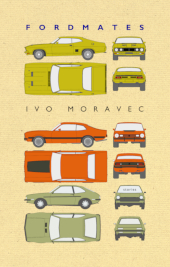The Porcupine's Quill
Celebrating forty years on the Main Street
of Erin Village, Wellington County
BOOKS IN PRINT
Fordmates by Ivo Moravec
Fordmates explores, with humour and poignancy, the basic conflict that exists between the demands of mass production technology and the all-too-human instincts, needs, and aspirations of the workers who serve on the assembly line.
The stories in Fordmates ricochet headlong between comedy and tragedy, balancing the tedium and gruelling demands of the automotive assembly line with the workers’ gutsy attempts to preserve spirits and some semblance of sanity. Many of the stories revel in some unexpected small victory extracted from the daily routine, from the giddy foolishness of gloveball fights and improbable practical jokes to the terse satisfaction of outsmarting overbearing foremen. The persistent theme throughout remains the unbreakable spirit of the workers in the face of a relentless machine. In these linked stories, Ivo Moravec, himself a twenty-year veteran of the former St. Thomas Assembly plant, characterizes automotive factories as the source not only of Ford Crown Victorias and Mercury Grand Marquises but also of daydreams and paycheques, of philosophers and drug addicts, and of broken families and best mates.
Excerpt from book
From "The Curious Case of Robby"
People have recently been on the run from the body shop, even those with high seniority and good jobs. The few remaining workers are subordinated to the robots, supplying them with parts like door hinges or nuts and bolts. Working with robots is boring. Each robot in its yellow enclosure performs its jerky moves again and again, same old, same old. No robot shouts and starts jumping around, wildly slapping his body when a spark lands inside his coveralls, or his boots. A robot welds, or screws, or whatever, passively, silently. It never laughs, never teases a colleague up the line with a joke, never throws a gloveball. Boredom. Infinite boredom.
There’s plenty of time to think on the line, and my mind has been buzzing with all kinds of thoughts. At first, those thoughts were usually chaotic, nebulous. They stirred in my mind like clouds gathering toward a storm, but thinking for hours and hours tends to sort things out and make them clear. The clouds open up for a moment, and the thinker is sometimes touched by the beam of an insight. He is, so to speak, illuminated. In a flash, he understands much more than he’d thought he could apprehend. One might eventually became a serious thinker on the line, maybe even a philosopher.
The robots. They’re reliable, don’t talk back, don’t make trouble. We people, are, well, there’s no use denying it, we reek of humanness. The robots are just numbers: thirteen needs to have its electrodes sharpened, nineteen requires a refill of new bolts. On the double, man. The robots serve the line, the people serve the robots. They’re servants. That’s what they’ve all come to in the body shop. What is more and more threatened is the proud job of the autoworker, the human being with the know-how and skills, a creature actually capable of creating something now reduced to the role of servant. With each advance in automation, he or she has less and less to do with building the car that once bore his or her signature. Less and less do we leave our fingerprints on it, our drops of sweat, our DNA. We autoworkers are being pushed into the background of production. We’re about two or three steps away from extinction.
There are days when I wonder if I can last here for the twenty-one more years I need to reach thirty, and retirement with full pension. Will I manage to reach my thirty years before the whole plant is taken over by robots? People are a disturbing element. They are not predictable, not programmable. They throw gloveballs. They want to have fun while working. Get rid of them. In the plant manager’s office, Art Intelligence will be sitting at a desk barking orders in ones and zeros, and robots will carry out the orders without caring that the whole plant is eerily silent, wordless, without laughter. There’ll be no f-words flying, no humming of songs or sneezing, no smell of cigarette smoke. The whole plant will be sunk into dim light without colour, smell or taste, with none of the personality that only people can supply. The whole production will be wonderfully logical, imperturbable, trouble-free and faultless, entirely efficient, marvellously inhuman. The plant will be controlled by robots, the cars will be designed and built by robots, and robots will probably drive them, because people won’t have the money to buy them. Having no Ford job to earn their wages, guys and gals will have to walk, maybe ride an old bicycle or a scooter found in the attic. But who knows? Which of us can fathom the depths of a robot’s motherboard. Maybe the privileged position, the monopoly, will muddle their thinking. Maybe they’ll start to organize into Robot Unions, then start striking, first for shorter work hours, then to demand that they be fed with nothing but the highest quality electricity, that their joints be lubricated with oil made solely of rose petals. Who can tell what the future has in store for robots? If it was work that succeeded in humanizing the apes, as some say, who knows what kind of effect work might have on robots. Maybe, just maybe, the whole automatizing revolution will wear itself out and we’ll see people pouring through the plant gates to work—for free!—just to be able to create something useful.
[Continued in Fordmates...]
Ivo Moravec is a former Ford employee who worked on the line at the St. Thomas Assembly Plant for twenty-one years, and who has since become a unique voice in Canadian literature. Born in Prague, Czechoslovakia, he obtained a Master of Economics from the Economics University in Prague, then worked for the Research Institute and for a Ministry of Industry think tank as a researcher and analyst. In 1983 he defected to Austria, then emigrated to Canada and settled in London. His writing career began with the publication of Tightrope Passage: Along the Refugee Route to Canada (McClelland & Stewart, 1997). Moravec retired from Ford in 2007. He has since dedicated more time to literature and has taken up a (winter) job as a ski instructor at Boler mountain. He lives in London, Ontario.
The Porcupine's Quill would like to acknowledge the support of the Ontario Arts Council and the Canada Council for the Arts for our publishing program. The financial support of the Government of Canada through the Canada Book Fund (CBF) is also gratefully acknowledged.





